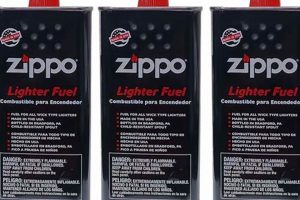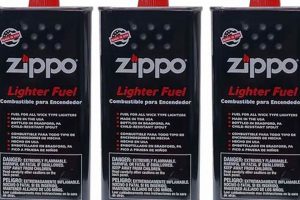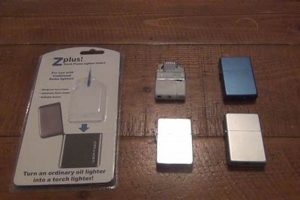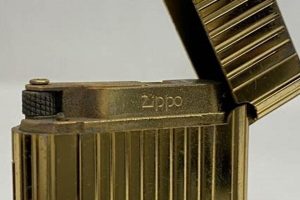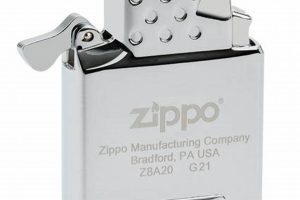Zippo lighters are designed for use with naphtha, a lighter fluid distinct from butane. While both fuels are flammable, their chemical properties and burning characteristics differ significantly. Attempting to fill a standard Zippo lighter with butane will not result in a functional lighter. Naphtha is less volatile than butane and requires the Zippo’s wicking system for proper combustion. Butane, on the other hand, is typically used in lighters with a pressurized, self-contained fuel chamber and an integrated ignition system.
The distinction between these fuel types is critical for the safe and effective operation of a lighter. Using an incorrect fuel can damage the lighter’s internal components, create a fire hazard, or simply fail to produce a flame. The design of the Zippo lighter, with its windproof chimney and wick-based fuel delivery, is specifically tailored for naphtha. This classic design has remained largely unchanged for decades, a testament to its functionality and reliability when used with the correct fuel.
This article will further explore the differences between butane and naphtha, the mechanics of various lighter designs, and the safety precautions necessary when handling flammable materials. Topics will include the history and development of the Zippo lighter, the properties of different lighter fuels, and recommendations for proper lighter maintenance and safe usage practices.
Tips for Proper Lighter Fuel Usage
Maintaining lighter functionality and ensuring safe operation requires using the correct fuel type. The following tips offer guidance on selecting and handling lighter fuels.
Tip 1: Consult the manufacturer’s instructions. Always refer to the manufacturer’s guidelines for the specific lighter model. This information provides the recommended fuel type and other essential safety precautions.
Tip 2: Differentiate between fuel types. Understand the difference between naphtha, butane, and other lighter fuels. Each fuel has distinct properties that dictate its appropriate use.
Tip 3: Use naphtha for Zippo lighters. Zippo lighters are specifically designed for naphtha fuel. Using butane or other fuels can damage the lighter and pose a safety risk.
Tip 4: Select the correct butane for butane lighters. Butane lighters often require specific butane purity levels or adapter nozzles. Using the incorrect butane can impede lighter function.
Tip 5: Exercise caution when refilling. Refill lighters in a well-ventilated area away from open flames or ignition sources. Avoid overfilling.
Tip 6: Store lighter fluid safely. Store lighter fluid in a cool, dry place away from children and heat sources. Follow all recommended safety guidelines printed on the fuel container.
Tip 7: Dispose of empty fuel containers properly. Adhere to local regulations for the disposal of empty lighter fluid containers. Do not incinerate.
Adhering to these guidelines will contribute to safer lighter operation and prolong the lifespan of the lighter. Proper fuel selection and handling are essential for both functionality and safety.
This information provides a practical foundation for understanding lighter fuel usage. The following conclusion will reiterate key takeaways and offer additional resources for continued learning.
1. Zippo Fuel
The explicit design of Zippo lighters for naphtha fuel directly answers the question of butane compatibility. Naphtha, a mixture of hydrocarbons, possesses specific properties crucial for the Zippo’s functionality. Its volatility, lower than that of butane, allows for controlled evaporation and combustion within the lighter’s wick-based system. This controlled burn is essential for the lighter’s signature wind-resistance. Attempting to introduce butane, a significantly more volatile fuel, into this system disrupts this carefully calibrated balance. The higher vapor pressure of butane could lead to uncontrolled releases of fuel, posing a fire hazard. Furthermore, the Zippo’s wick and chimney structure are not designed to contain or regulate the rapid expansion of butane upon ignition, likely resulting in malfunction or damage.
Consider a kerosene lamp versus a propane torch. While both utilize hydrocarbon fuels, their designs reflect the distinct properties of those fuels. A kerosene lamp employs a wick to draw fuel and regulate its combustion, much like a Zippo. A propane torch, however, utilizes a pressurized system to control the flow of the more volatile propane. Similarly, a Zippo’s design is fundamentally incompatible with butane’s properties, just as a kerosene lamp could not safely function with propane. Practical examples such as these illustrate the inherent link between fuel type and device design.
Understanding the specific fuel requirements of a Zippo lighter is critical for both safety and functionality. Using the correct fuel, naphtha, ensures the intended performance and avoids potential hazards associated with incompatible fuels. This knowledge contributes to the safe and effective use of Zippo lighters, preventing damage to the lighter and minimizing risks associated with improper fuel handling. The fundamental incompatibility between butane and Zippo lighters underscores the importance of adhering to manufacturer guidelines for fuel selection.
2. Butane
Understanding the distinct properties of butane as a fuel is crucial when considering its compatibility with Zippo lighters. This exploration will delve into the specific characteristics that differentiate butane from Zippo’s intended fuel, naphtha, and explain why this difference is central to the question of whether butane can be used in a Zippo.
- Volatility and Vapor Pressure
Butane possesses significantly higher volatility and vapor pressure compared to naphtha. This means butane vaporizes more readily at room temperature, creating a higher pressure within a container. While this characteristic is advantageous in pressurized butane lighters with controlled release mechanisms, it presents a safety hazard in a Zippo. The Zippo’s open wick system is not designed to contain the rapid expansion of butane vapor, potentially leading to uncontrolled flames or even explosions.
- Combustion Characteristics
Butane burns with a hotter, cleaner flame than naphtha. This difference, while seemingly beneficial, is problematic for a Zippo. The higher temperature of a butane flame could damage the Zippo’s internal components, particularly the wick and flint wheel. Furthermore, the cleaner burn of butane might not provide the necessary residue to keep the Zippo’s wick saturated, leading to inconsistent ignition.
- Storage and Handling
The differing storage and handling requirements of butane and naphtha also highlight their incompatibility with Zippo lighters. Butane requires pressurized containers, while naphtha is stored in simpler, non-pressurized containers. Attempting to introduce pressurized butane into a Zippo’s fuel reservoir, designed for non-pressurized naphtha, poses a significant risk of leakage and uncontrolled release of flammable vapor.
- Material Compatibility
The seals and components within a Zippo lighter are specifically designed for naphtha. Butane’s chemical properties could degrade these materials over time, leading to leaks or malfunctions. This material incompatibility further reinforces the importance of using the correct fuel type for a Zippo lighter.
In conclusion, the fundamental differences between butane and naphtha, encompassing volatility, combustion characteristics, storage requirements, and material compatibility, underscore the importance of using the correct fuel in a Zippo lighter. Attempting to use butane in a Zippo is not merely ineffective; it poses a significant safety risk and could damage the lighter. The design of a Zippo is inextricably linked to the properties of naphtha, highlighting the importance of adhering to manufacturer guidelines for optimal performance and safety.
3. Incompatibility
The incompatibility between butane and Zippo lighters stems from a fundamental design mismatch. Zippo lighters are meticulously engineered for naphtha fuel, and their components, from the wick to the chimney, reflect this specific design intent. Attempting to introduce butane, a fuel with vastly different properties, disrupts this carefully calibrated system and creates several key points of incompatibility.
- Wick and Fuel Delivery
The Zippo’s wick is designed to absorb and regulate the flow of naphtha, a relatively low-volatility fuel. Butane’s higher volatility overwhelms this system. The wick cannot effectively control the rapid vaporization of butane, leading to an excessive fuel release and potentially dangerous flames.
- Chimney and Airflow
The chimney surrounding the Zippo’s flame is calibrated for the combustion characteristics of naphtha. It regulates airflow to create a wind-resistant flame. Butane’s hotter and faster burn requires a different airflow dynamic. The existing chimney design is inadequate for butane combustion, leading to inefficient burning or potentially hazardous flare-ups.
- Fuel Reservoir and Sealing
The Zippo’s fuel reservoir and sealing mechanisms are designed to contain naphtha, a liquid fuel stored at atmospheric pressure. Introducing pressurized butane into this system risks damaging the seals and causing leaks. The reservoir itself may not be designed to withstand the higher pressure, potentially leading to structural failure.
- Ignition Mechanism
While both butane and naphtha lighters utilize a flint ignition system, the specific implementation differs. The Zippo’s flint wheel and striker are optimized for the ignition temperature of naphtha. Butane’s different ignition characteristics may not reliably ignite with the Zippo’s mechanism, leading to inconsistent performance.
These points of incompatibility underscore the fundamental design mismatch between butane and Zippo lighters. Attempting to circumvent this incompatibility by using butane in a Zippo is not only impractical but also potentially dangerous. The design of a Zippo lighter is intricately tied to the properties of naphtha, and any deviation from this intended fuel compromises the lighter’s functionality and safety. Respecting this design intent ensures proper operation and mitigates potential hazards.
4. Risk
Attempting to use butane in a Zippo lighter, despite their design incompatibility, presents significant risks of damage and malfunction. These risks extend beyond mere inconvenience and can compromise the lighter’s functionality, posing potential safety hazards. Understanding these risks is crucial for responsible lighter usage.
- Fuel System Damage
Butane’s higher vapor pressure can stress and damage the Zippo’s seals and internal components designed for lower-pressure naphtha. This can lead to fuel leaks, rendering the lighter unusable and creating a fire hazard.
- Wick Deterioration
Butane’s hotter flame can scorch and deteriorate the Zippo’s wick, designed for the lower temperature of naphtha combustion. A damaged wick leads to inconsistent ignition and reduced lighter lifespan.
- Clogging and Residue Buildup
While butane burns cleaner than naphtha, its combustion byproducts can still clog the Zippo’s intricate wick and chimney system. This residue buildup hinders airflow and fuel delivery, impacting performance.
- Ignition Failure
The Zippo’s flint and striker mechanism is calibrated for naphtha’s ignition properties. Butane’s different ignition characteristics can result in unreliable sparking and frequent ignition failures, rendering the lighter impractical.
These potential damages and malfunctions underscore the inherent risks of using butane in a Zippo lighter. The incompatibility between the fuel and the lighter’s design creates a cascade of potential problems, compromising functionality and potentially creating safety hazards. Adhering to the manufacturer’s recommended fuel, naphtha, is essential for maintaining the lighter’s integrity and ensuring safe and reliable operation.
5. Safety hazard
The query “can you put butane lighter fluid in a Zippo?” directly relates to a critical safety concern: the potential for fire. Using butane in a Zippo lighter, designed for naphtha, creates multiple fire hazards. Butane’s higher volatility and vapor pressure increase the risk of uncontrolled fuel release, leading to larger flames or even explosions upon ignition. The Zippo’s structure, not designed for pressurized fuel, might leak or rupture when filled with butane, further escalating the fire risk. Additionally, butane’s different combustion characteristics can produce higher temperatures than the Zippo is designed to withstand, potentially igniting surrounding materials.
Real-world scenarios illustrate these hazards. Imagine overfilling a Zippo with butane, leading to leakage and a sudden burst of flame upon ignition. Or consider a damaged seal resulting from butane’s incompatibility with the Zippo’s materials, causing a slow, undetected leak that creates a flammable atmosphere. These examples highlight the potential for serious accidents, including burns and property damage, arising from the misuse of butane in a Zippo lighter. The seemingly simple act of using the wrong fuel can have severe consequences.
Understanding the fire hazards associated with using butane in a Zippo is fundamental to safe lighter practices. Adhering to manufacturer guidelines regarding fuel type is not merely a recommendation but a critical safety precaution. Choosing the correct fuel, naphtha, significantly mitigates these risks and ensures the lighter operates as intended. This knowledge empowers users to make informed decisions, protecting themselves and their surroundings from potential harm. Safe lighter usage requires diligent attention to fuel compatibility and a thorough understanding of the associated risks.
6. Void Warranty
Using butane in a Zippo lighter, contrary to manufacturer specifications, directly impacts warranty coverage. Zippo’s warranty typically covers defects in materials and workmanship under normal use. However, using an incompatible fuel like butane is considered misuse and voids the warranty. This negates the manufacturer’s responsibility for repairs or replacements arising from damage caused by using the incorrect fuel. Understanding this connection is crucial for Zippo owners.
- Explicit Fuel Specification
Zippo explicitly states the use of naphtha fuel in their product instructions and warranty terms. This clear specification establishes the parameters of normal use. Deviating from this by using butane provides grounds for voiding the warranty, as the damage resulting from incompatible fuel is a direct consequence of user misuse, not a manufacturing defect.
- Damage Assessment and Responsibility
When a Zippo lighter malfunctions, the manufacturer assesses the cause of the damage. Evidence of butane use, such as residue or internal damage consistent with butane combustion, immediately points to user error. This absolves the manufacturer of responsibility under the warranty. The user bears the cost of any repairs or replacements.
- Preservation of Warranty Coverage
Maintaining valid warranty coverage requires adherence to manufacturer guidelines, particularly regarding fuel type. Using only the specified naphtha fuel safeguards the warranty, ensuring that legitimate manufacturing defects are covered. This proactive approach protects the consumer’s investment and ensures access to repair or replacement services as needed.
- Long-Term Cost Implications
While using butane might seem like a minor deviation, the potential consequences of voiding the warranty can have long-term cost implications. Repairs for a damaged Zippo, especially if internal components require replacement, can be significant. Furthermore, a voided warranty necessitates purchasing a new lighter if the damaged one is beyond repair. Adhering to fuel specifications avoids these unnecessary expenses.
The connection between using butane and voiding the Zippo warranty is undeniable. Using the incorrect fuel constitutes misuse, negating the manufacturers obligation for repairs or replacements. This underscores the importance of adhering to manufacturer guidelines for fuel type to maintain warranty coverage and ensure the longevity and proper function of the Zippo lighter. Responsible ownership includes using the correct fuel and understanding the implications of warranty terms.
Frequently Asked Questions
This FAQ section addresses common inquiries regarding the use of butane in Zippo lighters, providing clear and concise answers based on factual information.
Question 1: What happens if butane is used in a Zippo lighter?
Using butane in a Zippo lighter can result in malfunction, damage to internal components, and potential fire hazards due to the incompatibility of the fuel with the lighter’s design. The lighter may fail to ignite consistently, produce uncontrolled flames, or leak fuel, posing a safety risk.
Question 2: Why are Zippo lighters not designed for butane?
Zippo lighters utilize a wick-based system optimized for naphtha, a less volatile fuel. Butane’s higher volatility and pressure are incompatible with this system, creating risks of uncontrolled fuel release and damage.
Question 3: Can a Zippo lighter be modified to use butane?
Modifying a Zippo lighter for butane use is strongly discouraged. Such modifications can compromise the lighter’s safety mechanisms and structural integrity, increasing the risk of malfunction and fire hazards. It will also void any existing warranty.
Question 4: Is it safe to refill a Zippo lighter near an open flame?
Refilling any lighter, including a Zippo, near an open flame is extremely dangerous. Lighter fluid vapors are highly flammable and can ignite explosively. Always refill lighters in a well-ventilated area away from ignition sources.
Question 5: What type of fuel should be used in a Zippo lighter?
Zippo lighters are designed specifically for Zippo premium lighter fluid, a refined naphtha fuel. Using other fuels can damage the lighter and create safety hazards.
Question 6: Where can one find reliable information about Zippo lighter fuel and maintenance?
The official Zippo website provides comprehensive information regarding proper fuel usage, maintenance, and safety precautions. Consulting this resource ensures accurate and up-to-date information.
Understanding the specific fuel requirements and safety precautions associated with Zippo lighters is essential for their safe and effective use. Consulting reputable sources and adhering to manufacturer guidelines ensures optimal performance and minimizes potential hazards.
The following section provides concluding remarks and summarizes key takeaways regarding the use of butane in Zippo lighters.
Conclusion
Examination of the query “can you put butane lighter fluid in a Zippo” reveals a critical incompatibility. Zippo lighters, engineered for naphtha fuel, are not designed for butane. Butane’s higher volatility and distinct combustion characteristics create significant risks when used in a Zippo, including potential malfunctions, damage to internal components, and fire hazards. Attempting to modify a Zippo for butane use further exacerbates these risks and voids the manufacturer’s warranty. Adhering to manufacturer guidelines regarding fuel type is essential for safe and effective lighter operation.
Safe lighter practices necessitate informed decision-making. Understanding the inherent incompatibility between butane and Zippo lighters promotes responsible usage and mitigates potential hazards. Choosing the correct fuel, naphtha, ensures proper function and safeguards against the risks associated with incompatible fuels. This knowledge empowers users to protect themselves and their surroundings. Continued adherence to manufacturer guidelines and safety precautions promotes the longevity of Zippo lighters and fosters a culture of responsible fire safety.


